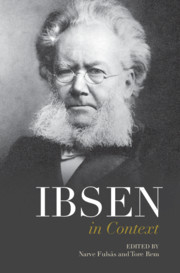Book contents
- Ibsen in Context
- Ibsen in Context
- Copyright page
- Contents
- Figures
- Contributors
- Preface
- Notes on the text
- Chronology
- Part I Life and Career
- Part II Culture and Society
- Part III Scandinavian Reception
- Part IV Internationalization
- Chapter 17 Copyright
- Chapter 18 Censorship
- Chapter 19 German Reception
- Chapter 20 British Reception
- Chapter 21 French Reception
- Chapter 22 Parodies
- Chapter 23 Early Globalization
- Part V Afterlives
- Further Reading
- Index
Chapter 18 - Censorship
from Part IV - Internationalization
Published online by Cambridge University Press: 23 April 2021
- Ibsen in Context
- Ibsen in Context
- Copyright page
- Contents
- Figures
- Contributors
- Preface
- Notes on the text
- Chronology
- Part I Life and Career
- Part II Culture and Society
- Part III Scandinavian Reception
- Part IV Internationalization
- Chapter 17 Copyright
- Chapter 18 Censorship
- Chapter 19 German Reception
- Chapter 20 British Reception
- Chapter 21 French Reception
- Chapter 22 Parodies
- Chapter 23 Early Globalization
- Part V Afterlives
- Further Reading
- Index
Summary
The Ibsen play that most often led to problems with the theatre censor was Ghosts. This play, partly as a result of censorship, also became closely associated with the European independent theatre movement. The most famous censorship episode occurred when the newly formed Independent Theatre in London wanted to produce the play in March 1891 and realized that this could not be done without forming a private club. The result was a succès de scandale, fierce criticism and abuse from conservative critics. The play was not licensed in Britain until 1914, and, due to the longevity of the British censorship institution, new stage translations of Ibsen’s plays had to be assessed by the censor’s readers all the way until the abolition of the theatre censorship in 1969. From the beginning, Ibsen may have benefited from a somewhat laxer and less centralized censorship system in Scandinavia. When he started writing his most controversial plays, he was also an established author at home, enjoying considerable status. In addition to this, his plays appeared first as books, thus putting a certain pressure on the censorship simply by being available. This chapter also considers the censorship laws and practices in America, Germany, France and Russia. It shows how opponents of censorship all over Europe associated themselves with Ibsen.
Keywords
- Type
- Chapter
- Information
- Ibsen in Context , pp. 157 - 165Publisher: Cambridge University PressPrint publication year: 2021

